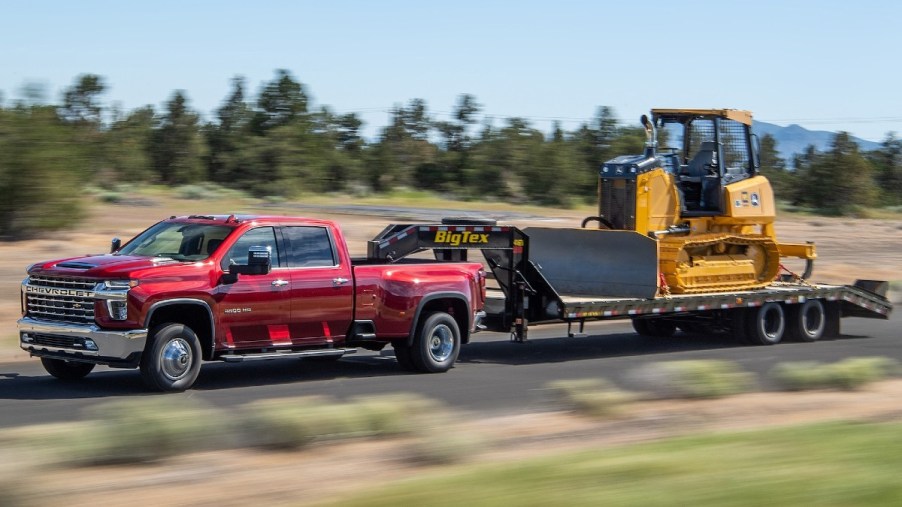
Why Max Towing Capacity Isn’t as Important for Heavy-Duty Trucks
Are you eying a heavy-duty truck that can tow massive amounts of weight, like a Chevrolet Silverado 3500HD, but aren’t sure which is the best? It helps to know that max towing capacity isn’t as important as you may think. In some cases, you might not even be able to use the max towing. Here’s why.
Slight differences in towing capacity don’t always matter
Some heavy-duty trucks, like the 2023 Chevy Silverado 3500HD, boast a maximum towing capacity of 36,000 pounds. That’s impressive, but some pickups can tow even more.
Take, for instance, the 2023 Ram 3500 Mega Cab. When properly equipped, it can tow 37,090 pounds. That’s 1,709 pounds more than the Silverado 3500HD.
That number matters when you’re bragging about your truck to other enthusiasts. But in real-world productivity, other factors are more important than the max towing capacity.
There’s more to a heavy-duty truck than its towing capacity
Before you buy a heavy-duty truck, determine what you really want. Do you need it for work? Do you want to go off-roading on the weekends? Or do you simply like trucks, and no SUV or sedan will ever do?
The engine is another significant factor. Do you want a diesel power plant, or would you prefer gasoline? Or perhaps you want to skip the engine and go all-electric.
Another factor to consider is the truck bed. Do you need a long bed for hauling large items, or would you be OK with something shorter, like the bed in the Jeep Gladiator?
Finally, comfort is probably one of the top areas to consider when choosing a truck, especially if you plan to spend a lot of time in it. You might not care about lumbar support, but you should at least feel like you can sit behind the wheel for extended periods without having to fidget or pull over to stretch.
If you must have a heavy-duty truck with high max towing capacity, there is one question you need to answer. Can you actually drive this truck when it’s fully weighed down?
Most drivers can’t handle a heavy-duty truck’s max towing capacity
Drivers aren’t legally allowed to tow the max capacity for many heavy-duty trucks unless they have a valid commercial driver’s license (CDL).
To better explain this, let’s start with the gross vehicle weight rating (GVWR) and the gross vehicle weight (GWR). “Rating” is only one extra word, but it creates a massive difference when determining what you can and can’t do according to the law.
The chassis manufacturer determines the GVWR, and it decides the maximum weight rating. That includes the truck’s weight and any cargo and passengers inside before adding a trailer. Federal law comes into play after that and might require a CDL to tow massive loads.
“When the trailer in the truck-trailer combination has a GVWR of 10,000 pounds or less, the CDL requirements allow for a greater GCWR for both the truck and trailer without requiring a CDL license,” Drive Wyze explains. “For example, a truck with a GVWR of 26,000 pounds or less can tow a trailer with a GVWR of 10,000 pounds or less and not require the operator to have a CDL under federal requirements. However, CDL requirements mandate that the truck and trailer GVW not exceed 26,000 pounds and 10,000 pounds, respectively.”
With that in mind, you should decide if you’re interested in getting a CDL. If not, max towing capacity should not be a determining factor when considering a heavy-duty truck.


